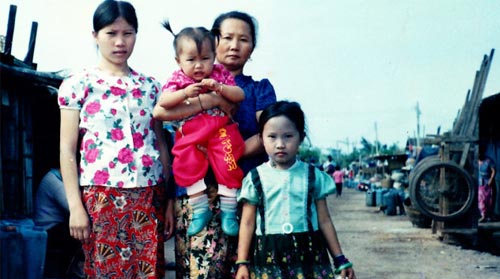
Magazine, Living Well, By Julian Do, Contributor to The Immigrant Magazine
LOS ANGELES, California — The Covid-19 pandemic, also known as the Coronavirus, continues to wreak havoc worldwide. Of the 2,158,250 confirmed cases worldwide, the US still leads with 662,045 confirmed cases, 28,998 deaths, and 54,703 recoveries as of April 16, according to the Johns Hopkins University’s Coronavirus Resource Center’s data tracking.
On same day, in California, there are 28,090 confirmed cases with 973 deaths, based on the tracking by the Los Angeles Times.
To date, unfortunately, no state or federal health agencies have provided any comprehensive demographic data of people who have been infected or died from Covid-19. However, many county reports on the Covid-19 outbreak in Illinois, Wisconsin, Michigan, and Louisiana have shown disproportionate, alarming high mortality rates among African Americans.
In Wisconsin’s Milwaukee County alone, ProPublica reported that African Americans accounted for 80% of confirmed deaths.
This impact to the African American community doesn’t surprise Dr. Stacie L. Walton, a pediatrician with background in public health.
“The African American community has already experienced epidemics of poor health and other disparities way before this outbreak,” says Dr. Walton during a recent Covid-19 telebriefing — part of a series on assessing healthcare and other public services during the pandemic organized by Ethnic Media Services and sponsored by the Blue Shield of California Foundation.
Also featured on the telebriefing were: Dr. Daniel Turner-Lloveras, assistant professor of medicine at Harbor-UCLA/David Geffen School of Medicine at UCLA; Kerri Talbot, director of Federal Advocacy-Immigration Hub; Sunita Lough, IRS Deputy Commissioner, Services & Enforcement; Sebastian Sanchez, staff attorney, Employment Rights Project – Bet Tzedek Legal Services; and Dr. Tung Nguyen, professor of medicine at UCSF.
Dr. Turner-Lloveras says other ethnic and immigrant populations face similar situations as the African American community and believes the impact on communities of color would be clear once demographic data reports become available.
Meanwhile, health and economic resources are emerging to help ethnic and immigrant populations, the most vulnerable demographics in the Covid-19 crisis in America. Here are the health services and economic assistance from the federal government and California that the underserved communities can tap into immediately.
Federal and California Covid-19 Healthcare Assistance
The recently passed Coronavirus Aid, Relief, and Economic Security (CARES) Act, which provides more than $2 trillion in economic relief, does not provide enough economic supports and health coverage for the immigrant communities in general, and the undocumented population is totally excluded, says Talbot.
She adds that the rules are so strict that immigrant households with mixed status, such as having any undocumented member, would also be disqualified from receiving any economic assistance.
However, since the CARES Act grants federal funds for hospitals, community clinics, and FEMA (Federal Emergency Management Agency), and add money to Emergency Medicaid to provide Covid-19 tests and ICU treatments across the country, immigrant families can access these services in their local areas.
As Congress is considering another stimulus bill, her organization is lobbying to have the undocumented immigrant population included because they are doing many essential services in food production, restaurants, delivery, and even healthcare. This group needs help to pay rents and put food on family tables.
In California, health officials and political leaders have recognized early on that, to effectively contain and combat Covid-19, all testing and treatment services must cover all residents, including undocumented immigrant and uninsured populations, who often reside in densely populated areas where the virus can easily spread.
Dr. Turner-Lloveras says that ethnic and immigrant populations who have symptoms should actively seek testing at the designated centers in their areas immediately, and no one will be turned away.
Federal Stimulus Payment
The CARES Act provides $290 billion in direct payments to eligible taxpayers.
Sunita Lough, IRS Deputy Commissioner, explains that all US adult residents whose income below $75,000 a year would receive a one time payment of $1,200. Household couples, who earn less than $150,000 a year and file income tax jointly, would receive $2,400 and their dependents under 17 should get $500 each. High school seniors and college student dependents are excluded.
For Social Security retirees and tax payers who have filed 2018 and 2019 tax returns, they don’t have to do anything. The treasury would automatically deposit their stimulus money in their bank accounts directly.
Lough suggests that all consumers, including the non-filers, should go to the IRS website to update their status and include bank account information because it would take the government longer to issue checks.
As of the week of April 13, the treasury has started making direct deposits. People can also track the status of their payment beginning on April 17 at the IRS website’s Get My Payment page.
“People should also be aware of scams and fraudsters out there,” says Lough. “Do not give private information to anyone who says they can get the stimulus money from the IRS for you.”
Finally, Lough reiterates Talbot’s earlier point that undocumented immigrants, unfortunately, are not qualified for any of these federal stimulus money although they have been paying taxes through their employment.
Federal and California Unemployment Benefits
Under the CARES Act, which provides $260 billion in expanded unemployment benefits, each state sets the time duration and determines its unemployment benefits accordingly.
In California, the maximum duration for receiving unemployment benefits is 26 weeks but the state has added an extra 12 weeks in light of the Covid-19 outbreak. “It means unemployed residents in California can receive up to 38 weeks of benefits,” says staff attorney Sebastian Sanchez from the Employment Rights Project under the non-profit Bet Tzedek Legal Services.
To date, the California EDD (Employment Development Department) has been issuing an average of $340 per qualifier a week on top of the weekly $600 from the CARES Act, which ends by July 31.
Sanchez adds that since the CARES Act’s expanded benefits covers gig workers and independent contractors, who have also been officially recognized as self-employed workers in California under the AB5 law, these individuals can file for all of the same benefits listed above. The process to qualify, however, is taking a little longer as the EDD is still developing a guideline.
California Covid-19 Economic Initiative
Recognizing the issue that undocumented immigrants are unfairly excluded from federal economic assistance, California is the first state in the country to step up with its own initiative.
California Governor Gavin Newsom, in the April 15 news release, announces that the state would provide $125 millions to undocumented immigrants impacted by Covid-19 pandemic beginning in May. California will contribute $75 million and philanthropic donors are to raise an additional $50 million.
Of the state’s two million undocumented immigrants, about 150,000 adults will receive a one-time payment of $500 per person with a maximum of $1,000 per household.
“California is the most diverse state in the nation. Our diversity makes us stronger and more resilient,” says Gov. Newsom in the prepared statement.
“Every Californian, including our undocumented neighbors and friends, should know that California is here to support them during this crisis. We are all in this together”.
Julian Do wrote this article for Immigrant Magazine with support from the Ethnic Media Services and sponsored by The Blue Shield of California Foundation.








